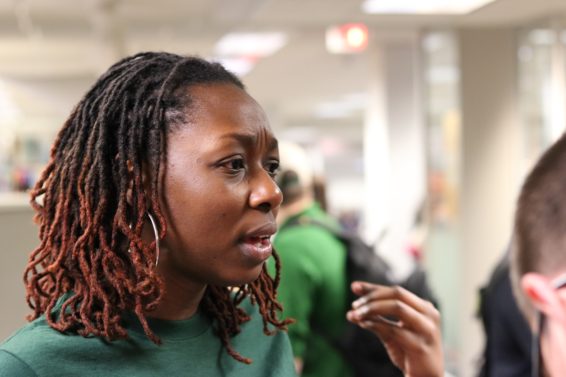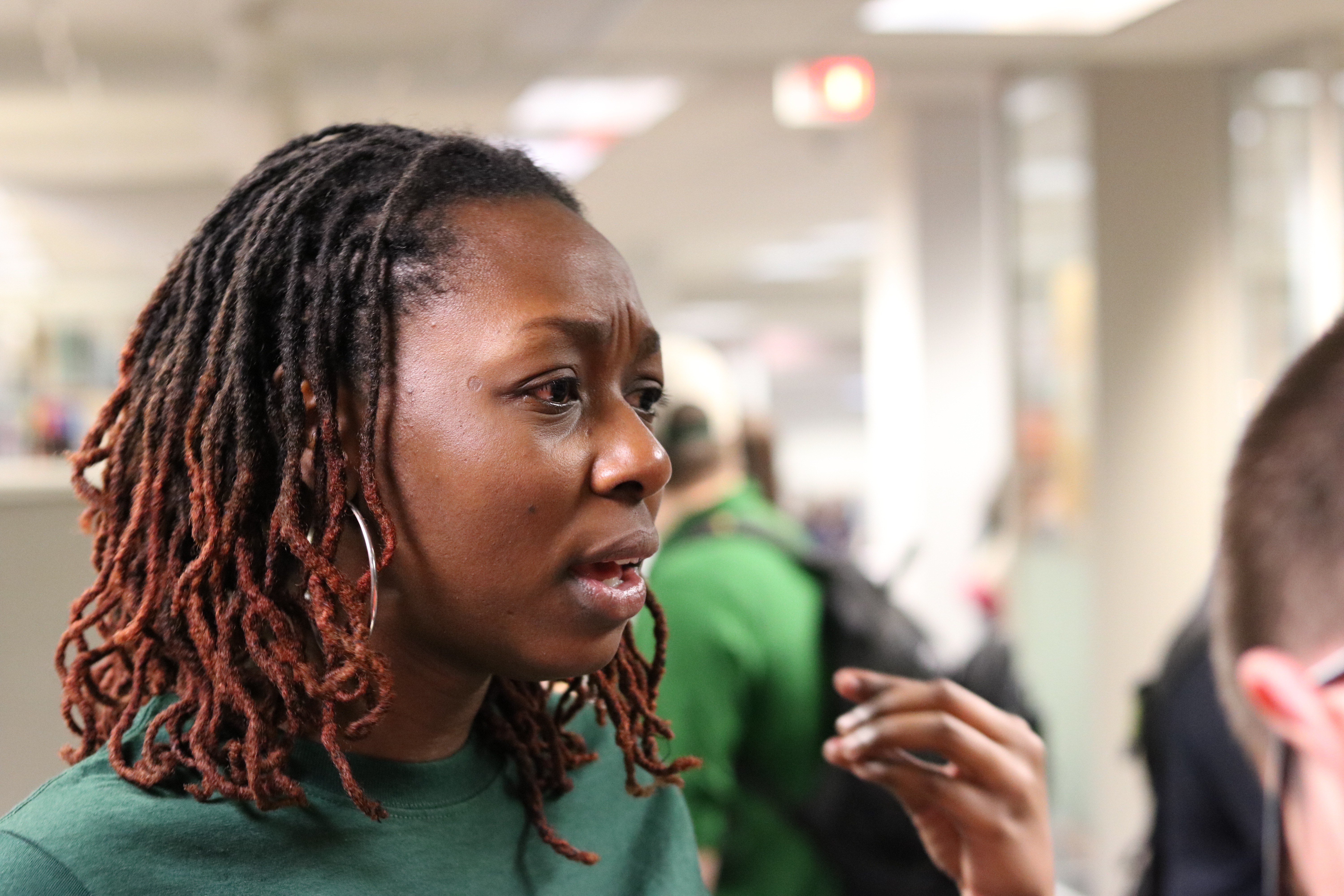By Michael Moore Jr.
Tuesday night the University Student Center ballrooms transformed into an election watch party.
Snowcones, popcorn, tacos, pizza and soda were abundant. Inflatables hosting mock gladiator duels and games of Twister stood in place.
Two big screens showed the results all night: one of them tuned to CNN, the other Fox News.
It was a party. But for many, the night soon deteriorated into a nightmare.

What many were expecting to be a shoe-in victory for Hillary Clinton instead became one of the most massive upsets in U.S. presidential election history. Clinton received 228 electoral votes, 42 less than the 270 necessary to clinch the nomination, and 62 less than the staggering 290 collected by her opponent.
By the end of the night, one thing was clear: Donald J. Trump was going to be the next president of the United States of America.
The next day, the results were discussed at another event on campus.
A post-election community conversation took place in the Poynter Corner of the Nelson Poynter Memorial Library and featured Dr. Judithanne Scourfield McLauchlan and Dr. Lia Merivaki from the Department of History and Politics. It also featured staff from the Wellness Center to help ensure that the discussion maintained a safe and respectful tone. The event was sponsored by the Academic Affairs and the Student Affairs Community Response Team.
The very first question of the meeting was posed by a man who admitted that he had voted for Trump. “Did anyone actually expect him to win?” he asked.
The room fell silent.
If anybody had expected it, they didn’t speak up.
Many minority students expressed worries about a Trump presidency. Another told a story of a man in a truck with a Trump flag honking at African-American students in the parking garage.
For education major Taylor Singleton, who is an orientation leader on campus, the prospect of Trump as president is an unfortunate one.
“The first thing I felt was sadness. When I hear Trump speak, I don’t think he’s speaking for people like me,” said Singleton. “I know in his acceptance speech he made a really big point about unity in America and mending the bonds, but I feel like he was speaking that just to speak it. It was not for me.”
Singleton made it clear that the type of rhetoric used on the campaign trail makes certain people targets, and that is a problem.
“My mind immediately goes to my friends who are illegal immigrants, whose friends are illegal immigrants, people of color, people of the LGBT community, people who are disabled. And I’m just thinking to myself, these people are not safe in this environment,” Singleton said.
The election results weren’t just shocking. To some students, they felt threatening.
“I believe 24 hours ago we were all a little safer than we are now,” Singleton said.
Singleton admitted that she isn’t the biggest fan of Clinton, but voted for her because she felt like it was the right decision.
“I did not vote for Trump. I voted for Hillary. And that’s not a vote I wanted to make, I feel like I was forced to make that vote. Because if I was to vote for the third party, it would not have counted as heavily. I’m not a Hillary fan and I’m not a Trump fan. I voted for the lesser of two evils,” Singleton said.
Juan Salazar had a different take on the election results.

While most were shocked by the outcome, Salazar didn’t appear to be phased.
“When I found out about it I was kind of indifferent because I knew it was either Hillary or Trump. It would have only surprised me if a third-party candidate would have won,” he said.
One might expect the election results to incur some level of disappointment or joy depending on political convictions, but for Salazar, neither adequately described his position.
“I’m not really into politics but I’m getting more interested in it because a lot more people are talking about it and [I see] the reactions and how hurt some people are. It inspires me to want to go for public office or at least learn more about it over the next few years,” Salazar said.
People like Singleton and Salazar are not alone.
Singleton doesn’t hate anyone for the way they voted. At the watch party she sat side-by-side with Trump supporters as the results were read and had an open dialogue with them about why they voted the way they did.
She initially felt sad about the election. That sadness turned to anger. Ultimately, however, it led to a sense of understanding.
“Welcome to America, where all different types of people can get together to watch an election and take our losses and take our wins,” she said.



